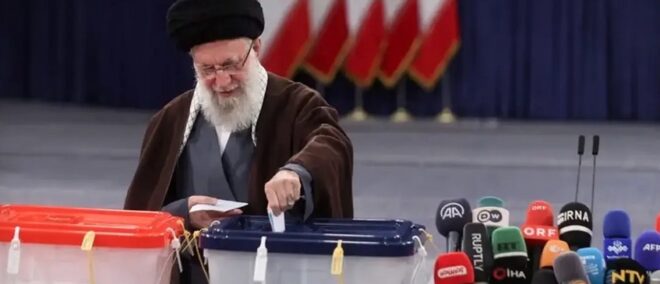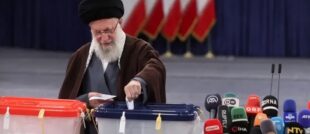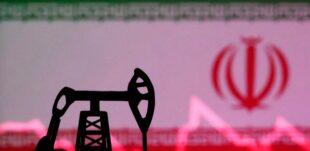Iranwire – Iran’s Supreme Leader Ali Khamenei’s attempt to legitimize the Islamic Republic has failed.
“Elections are always a test. High turnout is the pride of the Islamic Republic. People’s participation means that the Islamic Republic is literally a republic.”
With these words last week, Khamenei put the people in front of two choices: vote and approve the establishment or boycott and reject it.
On the morning of election day, he emphasized that “the continuity, stability, honor, and reputation of the Islamic Republic in the world depend on the presence of the people.
“To prove the integrity and honesty of the Islamic Republic, the presence of the people is a necessary and obligatory thing.”
He clarified that the presidential election is a full-fledged referendum.
Now with the announcement of the results, it is time to read the outcome of this referendum.
Before analyzing the results of the 2024 referendum, the question arises: why did Ali Khamenei, who previously stated, “Even those who do not accept the system and the leadership, come to the polls,” tie the credibility and reputation of the system to high participation this time?
His miscalculation was that he believed high participation with the support of reformists was certain, especially against candidates like Saeed Jalili, unaware that the majority of the people and the middle class had completely lost hope in changing the conditions within the Islamic Republic.
By turning the election into a referendum and insisting on the idea of “participation = approval of the system” and widely promoting it, Khamenei experienced a significant failure, which can be approached from several angles.
Failure with Statistical Logic
Out of a total of 61,452,321 eligible voters in the 2024 elections, only 24,735,185 people participated according to the government’s official report.
This means that less than 40 per cent of eligible voters cast their votes.
According to statistical logic, a referendum victory requires fifty per cent plus one vote.
The Islamic Republic failed to secure the votes of the majority.
If we subtract the invalid votes from the total, the participation rate drops further, highlighting the extent of this failure.
In this election, 1,256,959 people, which is five times the total votes of the fourth candidate, cast spoiled ballots.
Discourse Failure
A significant majority of the population chose the path of “sanctioning and not supporting the system” over “voting and approving the system.”
Over 10 million people, representing 42 per cent of the participants, did not align with the leader’s preferred candidate.
Khamenei defined the ideal candidate as someone with sincere belief in the revolution and system foundations.
He cited Ebrahim Raisi as an example, yet nearly half the voters supported a candidate who opposed Raisi’s path and advocated for changes in the government’s roadmap.
Failure to Maintain Forces
The Friday election revealed that the leader of the Islamic Republic failed to maintain the loyalty of core supporters.
Participation was minimal compared to previous elections, and a reformist candidate emerged victorious.
This indicated that even fundamentalist and traditional supporters, who typically back the Islamic Revolution candidates, did not vote for them this time.
The vote basket of Ebrahim Raisi, which once held 18 million votes, was split between Masoud Pezeshkian and Saeed Jalili, showcasing a significant shift in loyalty.
People’s Reaction to the Referendum in Khamenei’s Style
For most Iranians, this election was not a referendum.
They no longer needed to boycott the elections to express opposition to the system.
The people’s dissatisfaction was evident through various means, not just through election participation.
Even Islamic Republic-approved candidates admitted to widespread public dissatisfaction during debates and interviews.
Many of Masoud Pezeshkian’s supporters have openly said that they did not intend to legitimize the Islamic Republic.
 Shabtabnews In this dark night, I have lost my way – Arise from a corner, oh you the star of guidance.
Shabtabnews In this dark night, I have lost my way – Arise from a corner, oh you the star of guidance.



